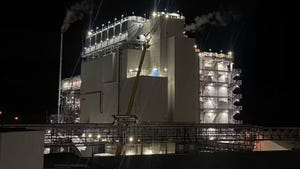Braskem CEO talks Brazil, bioplastics in NYSE visit
Brazil will need to build a new resin plant each year until 2020 to keep up with the booming country's burgeoning plastics demand. Carlos Fadigas, Braskem S.A. CEO, detailed his country's escalating hunger for plastics and Braskem's plans to help satiate that domestic demand while also expanding its reach outside South America.
April 19, 2011
CEO, detailed his country's escalating hunger for plastics and Braskem's plans to help satiate that domestic demand while also expanding its reach outside South America. Meeting with investors and media at the New York Stock Exchange on April 19, Fadigas finished Braskem Day at the exchange from the trading floor by ringing the market's closing bell.
Speaking with PlasticsToday by phone on the morning of his visit, Fadigas said that in addition to being listed on the NYSE (BAK), Braskem's shares can also be found on the São Paulo and Madrid stock exchanges. Following the economic crisis of 2008 and 2009 and after physically expanding into the U.S. last year with the February purchase of Sunoco Chemicals Inc.'s polypropylene (PP) business for $350 million, Fadigas said his company felt it was time to once again return to Wall Street.
"It has been very important for us to be in the U.S. and meet with investors and discuss Braskem's strategy," Fadigas told PlasticsToday. "That has been reinforced by the fact that we bought an asset in the U.S. last year, and now have three polypropylene plants here." Fadigas said that at this time Braskem has 5.5 million tonnes of capacity in Brazil and 1.5 million tonnes of capacity in the U.S.
In a presentation to investors, Fadigas laid out three key areas of focus for the company going forward: Brazil, internationalization, and sustainable chemicals. On the first point, Fadigas said Braskem already holds a 69% share of the Brazilian market, and 60% share of the South American market, with 28 of its 31 facilities in Brazil. The company is majority held by the privately owned conglomerate, Odebrecht, but Brazil's national oil and gas company, Petrobras, holds a 47% stake, and it's that integration to oil and natural gas supplies that Braskem believes will give it an advantage going forward. In particular, the company cited new gas supply from pre-salt exploration as bringing competitiveness to new projects in Brazil.
As part of its internationalization strategy, Braskem is currently constructing an integrated petrochemical complex in Mexico in a 65:35 joint venture with IDESA, with Braskem the majority partner and ethane to be supplied from Mexican national energy supplier, PEMEX. Operation startup for the ethylene plant is planned for January 2015. The company is also evaluating additional projects in Peru and Venezuela, according to Fadigas. From 2013-2015, it has already said it will invest in new butadiene (100 kilotons/yr) and biobased PP operations. In 2011, the company will spend $1 billion on capital expenditures, with 30% of that intended for capacity expansions.
Fadigas said that Braskem is already ramping up its production of sugar-cane derived PE that began in September of last year, and it sees bioplastics and biobased chemicals as an important "niche" product going forward. The company believes its bioplastics, which are based on sugar cane ethanol versus ethanol from corn or other agricultural feedstocks, are the most cost competitive among the bioresins. They are not, however, intended to be cost competitive with fossil fuel based plastics. "In the biopolymer space," Fadigas said, "our materials are the most competitive compared to other bioplastics."
About the Author(s)
You May Also Like


